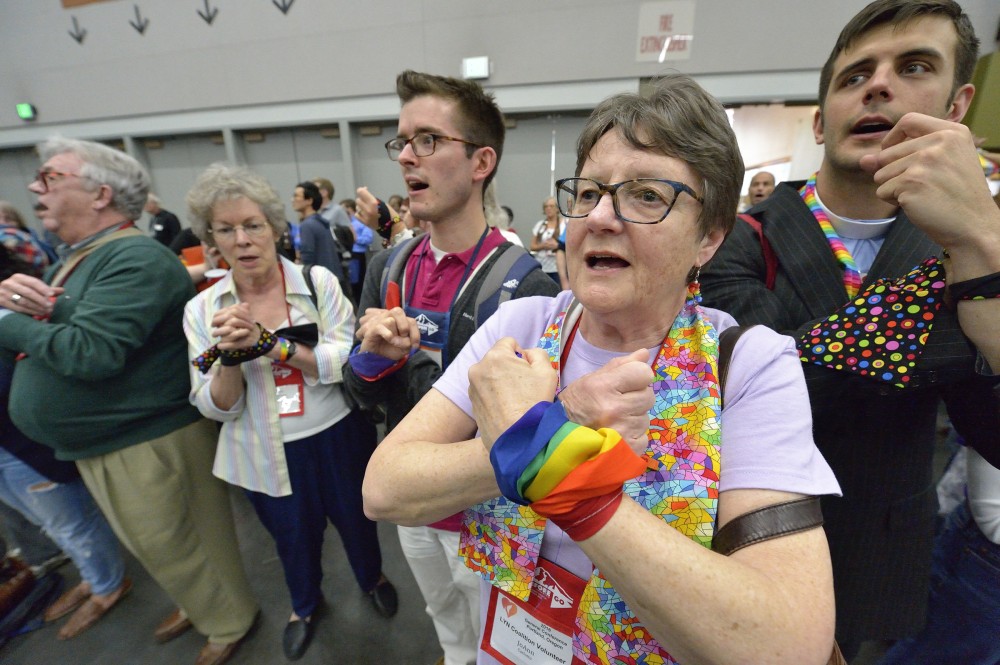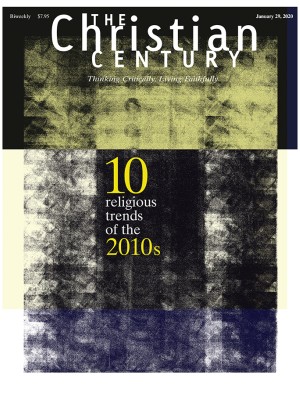United Methodists plan a split over LGBTQ differences

A diverse 16-member group of United Methodist bishops and other leaders has offered a proposal that would preserve the United Methodist Church while allowing traditionalist-minded congregations to form a new denomination. The separating group would get $25 million in United Methodist funds and would keep its local church properties. Details are in a nine-page “Protocol of Reconciliation and Grace through Separation,” released January 3.
The proposal—reached with the help of famed mediator Kenneth Feinberg, who worked on the federal September 11th Victim Compensation Fund—would have to be approved by the 2020 General Conference, which meets in May in Minneapolis. Drafting of legislation is still under way for that assembly, which is the only body that speaks for the 13-million-member global denomination.
Read our latest issue or browse back issues.
But given the broad, influential coalition involved—including bishops from around the global church and leaders from advocacy groups often sharply at odds—the protocol may offer a road map for resolving the denomination’s decades-long struggle over accepting same-sex marriage and ordaining gay pastors.
New York Conference bishop Thomas Bickerton, part of the group, said the contentious special meeting of the General Conference last February underscored intensifying divisions and the need for amicable separation.
“It became clear that the line in the sand had turned into a canyon,” Bickerton said. “The impasse is such that we have come to the realization that we just can’t stay that way any longer.
“This protocol provides a pathway that acknowledges our differences, respects everyone in the process and graciously allows us to continue to live out the mission of making disciples of Jesus Christ for the transformation of the world, albeit in different expressions.”
The plan looks toward a restructuring of the remaining global United Methodist Church into regions, with flexibility to adapt church policies, including on LGBTQ inclusion.
Meanwhile, traditionalists who would form a new denomination could continue what they see as Bible-supported restrictions on same-sex marriage and ordination of gay persons.
The traditionalist Wesleyan Covenant Association already has taken steps toward forming a new denomination, such as drafting a book of policies and doctrines. Bickerton and Keith Boyette, WCA president, said the negotiating team’s assumption is that the new church would emerge out of the WCA.
Boyette was part of the group developing the proposal. He said traditionalists have long felt that divisions in the United Methodist Church were irreparable and that an amicable separation was the best way forward.
“I believe this is a fair and equitable solution that puts decades of conflict behind us and gives us a hopeful future,” he said.
Also negotiating and signing onto the agreement was Jan Lawrence, executive director of Reconciling Ministries Network, which has long sought to remove restrictions against LGBTQ participation in the denomination.
“As a United Methodist who is LGBTQ, my priority at the table was to make sure we addressed the full participation of LGBTQ people in the life of the church, making sure the answer was not ‘ask us again in 2024,’” she said. “The language needs to be removed now. I am pleased that there is opportunity here for that to happen in 2020.”
The proposal would allow other United Methodist churches to form their own denominations, while foreseeing ecumenical agreements and cooperation on some fronts.
The proposal also calls for supporting communities historically marginalized by racism by allocating $39 million over eight years to strengthen Asian, black, Hispanic-Latino, Native American, and Pacific Islander ministries, as well as Africa University. Of that total, $13 million would come from funds the separating traditionalist denomination would forgo.
A clear catalyst for the negotiations was the 2019 General Conference, which saw passage of the so-called Traditional Plan reinforcing restrictions on same-sex weddings and ordination of LGBTQ persons—but also igniting passionate, ongoing resistance in the US by supporters of full inclusion.
The tougher enforcement of rules provided by the Traditional Plan went into effect January 1. However, the proposal calls for holding “in abeyance” any administrative or judicial processes related to same-sex weddings or ordination of gay clergy.
“You cannot stop someone from filing a complaint. Neither can you stop someone from requesting a trial,” Bickerton said. “You can hold a complaint in abeyance. That’s our request.”
The group behind the proposal has asked the Council of Bishops to request that the Judicial Council consider legislation related to the proposal before the opening session of the 2020 General Conference. The group also wants the Council of Bishops to seek a report on the financial impact of the proposal.
The FAQ accompanying the protocol directly addresses post-separation realities: “The United Methodist Church will be smaller. The church will need to quickly assess the impact of churches leaving and adjust infrastructure and spending accordingly. The long-term solution lies in the broad reform that is needed.” All of those signing the protocol agreed to support the development and implementation of enacting legislation.
“The fact that we were able to come together from across the world, from across theological spectrums, and define an opportunity to collaborate for the sake of the church we all love is a monumental thing,” Bickerton said. “My hope would be that the delegates to the General Conference would be able to employ that same spirit as they undertake their work in Minneapolis.” —United Methodist News Service






